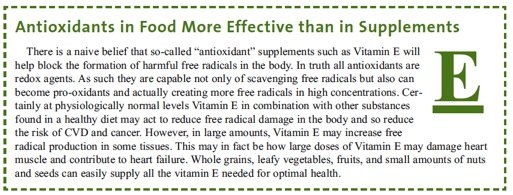For many years vitamin E has been among the most popular food supplements taken by Americans. Some earlier studies of Americans who reported taking vitamin E supplements suggested that it might reduce the risk of cardiovascular disease (CVD) and at least some forms of cancer.
Epidemiological studies have suggested that people taking Vitamin E supplements were less likely to have a heart attack or develop cancer. However, given all the media hype touting the supposed benefits of Vitamin E, it could be that people who take Vitamin E supplements might be more health conscious. Therefore, they would be less likely to smoke, be more likely to exercise, and have better diets on average than those not taking Vitamin E. Only randomized controlled clinical trials can truly establish the impact of Vitamin E supplements on disease risk. A large meta-analysis published in the Annals of Internal Medicine in 2004, found those taking high-dose Vitamin E supplements got no overall benefit and were slightly more likely to die.One of the more popular theories as to how Vitamin E?s antioxidant properties might cut the risk of CVD.White blood cells (monocytes) that migrate into the artery wall and turn into amoeba-like cells called macrophages are also called foam cells. These macrophages are designed to engulf and destroy foreign material and abnormal or dying cells. Once LDL particles get modified by oxidation, they are seen as foreign bodies by the immune system and are quickly taken up by macrophages.If there are many modified LDLs in the artery wall then the macrophages get so stuffed with LDL particles they look like they are full of foam under a microscope, hence the name "foam cells".As these foam cells accumulate in the artery wall, they form a yellowish fatty streak, which is the earliest lesion in the atherosclerotic process. The hope was that large doses of vitamin E (because it can act as an antioxidant and is transported in LDL particles) might slow down the oxidative modification of LDL particles and prevent the build up of foam cells. Unfortunately this hope is all but gone today.Oxidative damage and free radical formation is also part of inflammatory processes and can lead to DNA damage, which some believe may promote cancer. Inflammation is also believed to contribute to the rupture of atherosclerotic plaques, which is usually what triggers most heart attacks and strokes.Vitamin E supplements in the short term do seem to improve endothelial function. While impaired endothelial function is associated with CVD, it is physiologically abnormal to consume larger amounts of any vitamin then one could get naturally from food. In high doses, Vitamin E may have some benefits like a drug, but like a drug it may also have adverse effects as well so we need long-term placebo-controlled trials to make sure the benefits outweigh the risksOne small study revealed that those who took vitamin E supplements along with drugs shown to reduce CVD risk found that taking the Vitamin E supplements actually reduced the effectiveness of the drugs. Indeed, those taking the Vitamin E along with the drugs saw their arteries grow more narrowed while those who took the cholesterol-lowering drugs (Niacin + a Statin) had a modest reduction in the amount of narrowing in their coronary arteries.1A randomized clinical trial looked at people 55 years and older with CVD or diabetes. About 7,000 subjects took either 400 IU of Vitamin E or a placebo for seven years. This study found no overall effect of vitamin E supplementation on the risk of getting or dying from cancer. Vitamin E supplementation also had no beneficial impact of the risk of dying from a heart attack or stroke. However, this study did note a disturbing increase in the risk of developing heart failure in those taking vitamin E supplements.2
Bottom Line: Vitamin E supplements have no proven benefit for reducing the risk of dying from cancer or CVD and may increase the risk of developing heart failure and slightly increase the risk of dying. People taking Vitamin E supplements in hopes of reducing their risk of developing cancer or CVD should probably stop taking it, particularly if they are developing heart failure. Given that heart failure is the #1 cause of admission to U.S. hospitals for those in their 60s and older it seems particularly prudent to discourage older Americans from taking high doses of Vitamin E.By James J. Kenney, PhD, RD/LN, FACN1. N Engl J Med 2001;345:1583-922. JAMA 2005;293:1338-47



